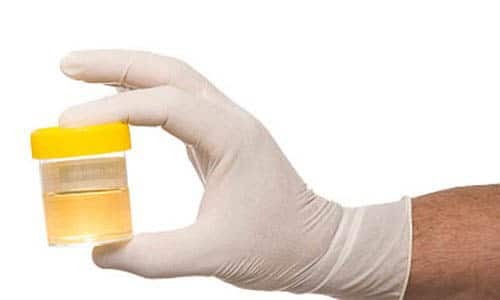Based on the results of urinalysis, specialists get a specific picture of the disease, in children the study allows controlling the processes of organic development. This is the most important diagnostic study, allowing timely detection of abnormalities in health. One of the most common disorders in masculine analyzes is mucus in the urine. There are many reasons for such a violation. It can be any urogenital inflammation and other pathological processes.

Mechanism of mucus formation
The inner lining of the urinary tract is lined with an epithelial layer, the cellular structures of which secrete specific mucus. The purpose of this mucus is to prevent irritations on the inner surface of the urinary tract. The cellular structures of the epithelium produce the volume of mucus that is necessary to neutralize the corrosive effect of urea.
The presence of mucus in the urine is quite normal, if such impurities are not visible to the eye and make up an insignificant amount.
Therefore, in an average, a small amount of mucus is present in the urine, which is determined only by its laboratory test. If the mucous impurities are visible in the urine without the use of any instruments, then such a factor indicates a pathological deviation in the functioning of the urinary system.
Why mucus symptoms deviate from the norm
A common reason for the formation of mucus in the urine is inflammatory urinary or kidney processes. Because of the urine, the urine retreat deteriorates, which subsequently leads to the appearance of mucus. In the male urine, mucus can also form on the background of hypertrophic changes in the prostate tissue. Often, the formation of mucus is due to factors such as inflammation of the kidney, bladder or canal urethra, through which urination is carried out.
The cause of inflammation in the urethra often becomes insufficient intimate hygiene or pathologies of venereal origin. Renal inflammation develops due to the penetration of microorganic structures like E. coli, staphylococcus, etc. Inflammatory processes caused by cystitis usually develop against the background of other pathologies penetrating into the bladder from other foci.
Sometimes, renal inflammation develops as a result of prostate tumors or abnormal narrowing of the urethra. Such pathological conditions lead to disturbances in the timely outflow of urine and urine, which cause infectious processes that provoke kidney failure and stone formation.
If the cause of mucus is a urinary or renal pathology, the patient can observe such manifestations as:
- Reduction of the daily urine rate;
- Lumbar pain;
- Characteristic burning during the process of urination;
- In the urine there is turbidity and sediment;
- There is a rapid desire to urinate.
A similar set of symptoms should cause a mandatory visit to the urologist, because inflammatory processes are often complicated, causing irreversible changes.

Prostatic pathology
As explained earlier, mucus in the urine of a man can be formed due to inflammatory prostatic processes. For similar reasons, prostatitis can be characterized by a chronic course or a sharp course. A man, along with mucus, observes and experiences such manifestations of pathology as:
- Sharp tenderness in the groin and perineum;
- Extraneous discharge from the urethra;
- Rapid urination;
- Sometimes fever, chills, hyperthermia.
In urine, in the laboratory study, also found blood cell structures, protein compounds and exudative inclusions. Chronic prostatitis is accompanied by a slightly different symptomatology. Along with urinary disorders and blunted soreness, a man experiences constant nervousness and fatigue, and his sexual functions are reduced, which immediately affects the sexual life.
Mucus in the urine is often found due to benign hyperplastic conditions like prostate adenoma.
Adenoma is considered a fairly common male disease. The prostate gland is enlarged, anxious rapid urges and a weak stream when urinating. The pathology progresses, in the urine there are admixtures of blood and mucus, and urination itself is accomplished by too small portions of urine. If the adenoma is started, then urine begins to leave on a droplet, so the full discharge of the bladder man can no longer. Therefore, if there is an initial symptomatology, it is necessary to contact a urologist, then recovery will be a simple and non-prolonged process, and will not entail unpleasant consequences.
Urolithiasis
Often, mucosal inclusions in the urine are a consequence of urolithiasis. A similar pathology is caused by metabolic disturbances leading to stone formation. In this situation, a man experiences symptoms like:
- Renal colic;
- Lumbar pains of a trailing nature;
- When there is a physical load such as lifting the weight, then the man has an involuntary urinary urge;
- Bloody impurities appear in the urine;
- Urination may unexpectedly terminate, indicating that the lumen of the urinary tract is blocked by calculi.
Pathology requires mandatory therapeutic effects, because it can lead to irreversible purulent-inflammatory effects.
Methods of treatment
When a mucus is detected, a specialist usually prescribes a more complete examination in order to identify the root cause of such a factor. When an inflammation of the bladder is detected, the patient is prescribed antimicrobial agents such as Nolycin or Augmentin. In addition to drug therapy, cystitis shows a strict implementation of the daily drinking regime - at least 2.5 liters. It is useful to use herbal teas, oatmeal or dog rose broth, etc.
With special care, it is recommended to treat kidney inflammations. It is important to comply with all medical prescriptions and recommendations, because any violation of therapeutic prescriptions leads to the chronicization of pathological disorders.
Renal inflammations are treated with antibacterial, anti-inflammatory, nitrofuran preparations like Biseptolum, nalidoxic acid. A good effect also have such herbal preparations as Kanefron and others.
Urolithiasis usually requires surgical intervention. You can remove the attack with painkillers and antispasmodics. At times, agents that help dissolve concrements are used, but they do not always have the expected efficacy.
Mucus in the urine does not belong to independent pathological processes - it is a symptom indicating the presence of disturbances in the activity of the genitourinary or urinary structures.



